8 Best Crypto Credit Cards With Spending Rewards in 2024

While cryptocurrencies have grown in popularity immensely as investable assets, there are not many merchants that directly accept payments in crypto. Thankfully, there’s a simple way around this problem for crypto holders – crypto credit and debit cards.
Crypto cards allow users to spend their cryptocurrency balances at any merchant. The crypto is automatically converted to fiat currency when the transaction is made, which means that the merchant receives fiat and avoids any price volatility risks associated with crypto.
There’s quite a few crypto cards available on the market today, including products from leading exchanges such as Binance and Coinbase, which makes it difficult to decide which option is the best for you.
In this article, we will examine the best crypto cards in the market today, compare their features, and explore the extent of crypto rewards you can expect to receive when using them for everyday purchases.
Key highlights:
- There’s a wide range of credit cards for cryptocurrency users available on the market.
- Typically, “crypto cards” work by converting a user’s cryptocurrency balances into fiat currency, which allows them to be used in everyday situations just like any other credit or debit card.
- Some crypto cards also offer cashback rewards in the form of cryptocurrency.
- We feature the 8 best crypto credit and debit cards available in 2024.
Here are the best crypto credit and debits cards in 2024:
- Binance Card – A crypto debit card with up to 8% rewards with BNB
- Ledger Card – A CL crypto card powered by Ledger software
- Coinbase Card – A crypto card with no token requirements and rotating crypto rewards
- Venmo Credit Card – A credit card that can automatically convert cashback rewards into crypto
- Crypto.com Visa Card – Earn rewards in CRO and get exclusive perks
- Wirex Card – A crypto card with up to 8% rewards for eligible members
- BitPay Card – A straightforward crypto card with cashback at supported merchants
- Gemini Credit Card – A credit card with crypto rewards of up to 3%
The 8 best crypto credit and debit cards: Examing top options for crypto card users in 2024
In this article, we’ll be showcasing the best crypto credit cards and debit cards that allow users to spend their crypto in everyday situations. All the cards featured in this article also provide some form of cashback reward, allowing users to earn a little bit of crypto every time they spend with their card. Let’s get started.
1. Binance Card – A crypto debit card with up to 8% rewards with BNB
Update: Binance Card services in the EEA (European Economic Area) are no longer offered as of December 20, 2023.
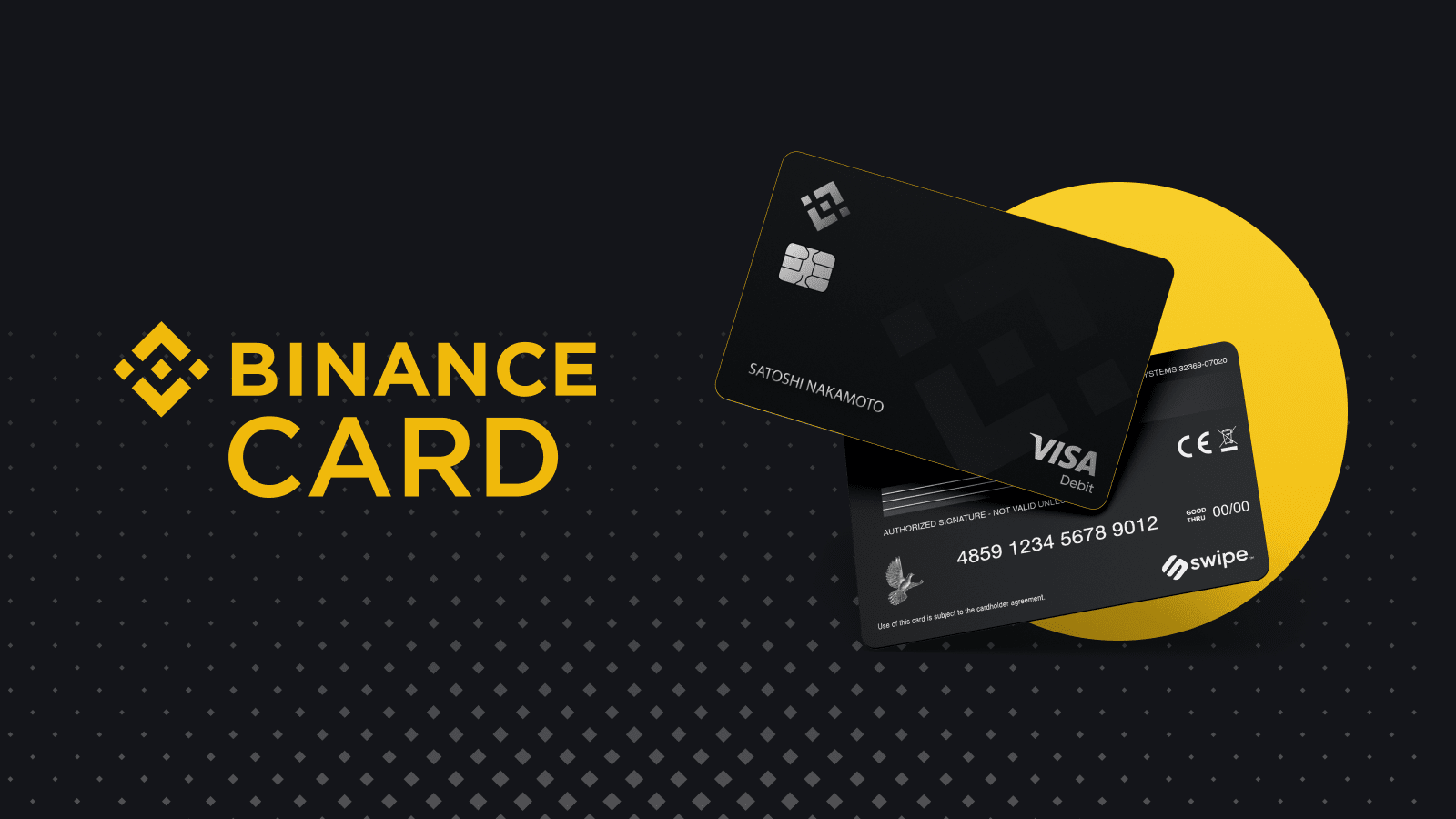
Binance Card is a crypto card issued by Binance, the world’s most popular cryptocurrency exchange. Binance Card function on the Visa payments network, allowing users to spend their crypto balances wherever Visa is accepted. Users can spend crypto balances held in their Binance Funding Wallet, with the funds being automatically converted to fiat to make payments.
The best perk of Binance Card is the ability to earn crypto cashback rewards every time you spend. Still, this comes with the caveat that you are required to hold some BNB tokens if you want to earn meaningful rewards.
The rewards paid to Binance Card users are in the form of BNB tokens. It’s possible to earn up to 8% cashback with BNB, although most users will realistically earn a smaller percentage.
The cashback percentage when using the Binance Card depend on your monthly average BNB balance in your Binance wallets. Here are the different tiers as of January 2023:
| Binance Card level | Monthly average BNB balance | Cashback rate |
|---|---|---|
| 1 | 0 BNB | 0.1% |
| 2 | 1 BNB | 2% |
| 3 | 10 BNB | 3% |
| 4 | 40 BNB | 4% |
| 5 | 100 BNB | 5% |
| 6 | 250 BNB | 6% |
| 7 | 600 BNB | 8% |
As you can see, obtaining the highest tier requires a monthly average BNB balance of 600 BNB, which translates to about $183,000 at the time of writing. This will be out of reach for most users. However, some of the lower tiers are quite accessible and still provide solid cashback rewards.
Get a Binance Card
2. Ledger Card – A CL crypto card powered by Ledger software
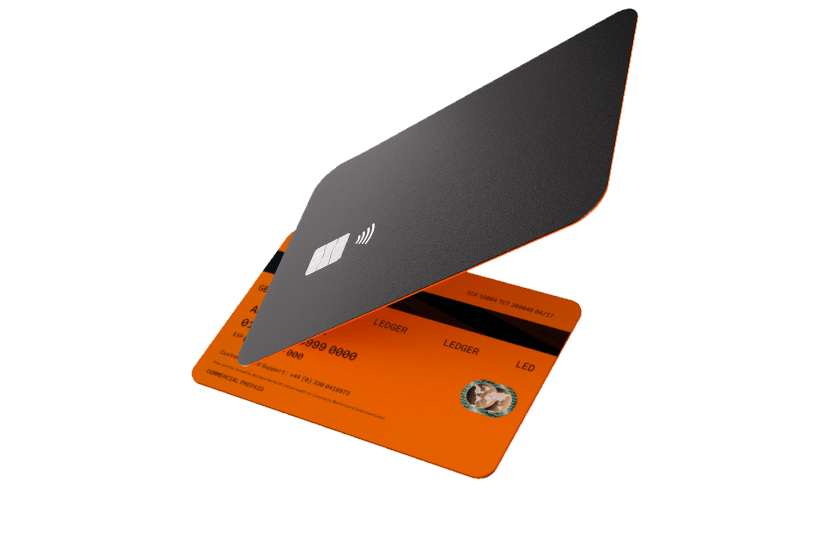
Ledger, the crypto wallet manufacturing firm, has partnered with fintech company Baanx to launch the Ledger Card (also known as CL Card), a prepaid Mastercard that allows users to spend their cryptocurrencies seamlessly at over 90 million merchants. The card, powered by Ledger technology, can be topped up using the Ledger Live app and will automatically convert cryptocurrencies into local currencies at the time of purchase.
The CL Card provides cashback rewards on every purchase, with users able to choose between Bitcoin and Tether (with up to 1% cashback) and Baanx (with up to 2% cashback) rewards. Holders can also use their crypto as collateral to borrow funds and get access to features such as Stableloan and Cryptodraft.
To get the card, users need to purchase a Ledger hardware wallet, which are widely considered as the best crypto hardware wallets due to their robust security and ease of use, and create an account on the CL platform, where they will need to verify their identity. For most users, the Ledger Nano X or S Plus are likely the best options, although the up-and-coming Ledger Stax could be a good choice for crypto power users. Although the card’s 2% spend fee is high compared to most competitors, its close integration with Ledger’s ecosystem makes it a convenient option for Ledger users.
Get a Ledger Card
3. Coinbase Card – A crypto card with no token requirements and rotating crypto rewards
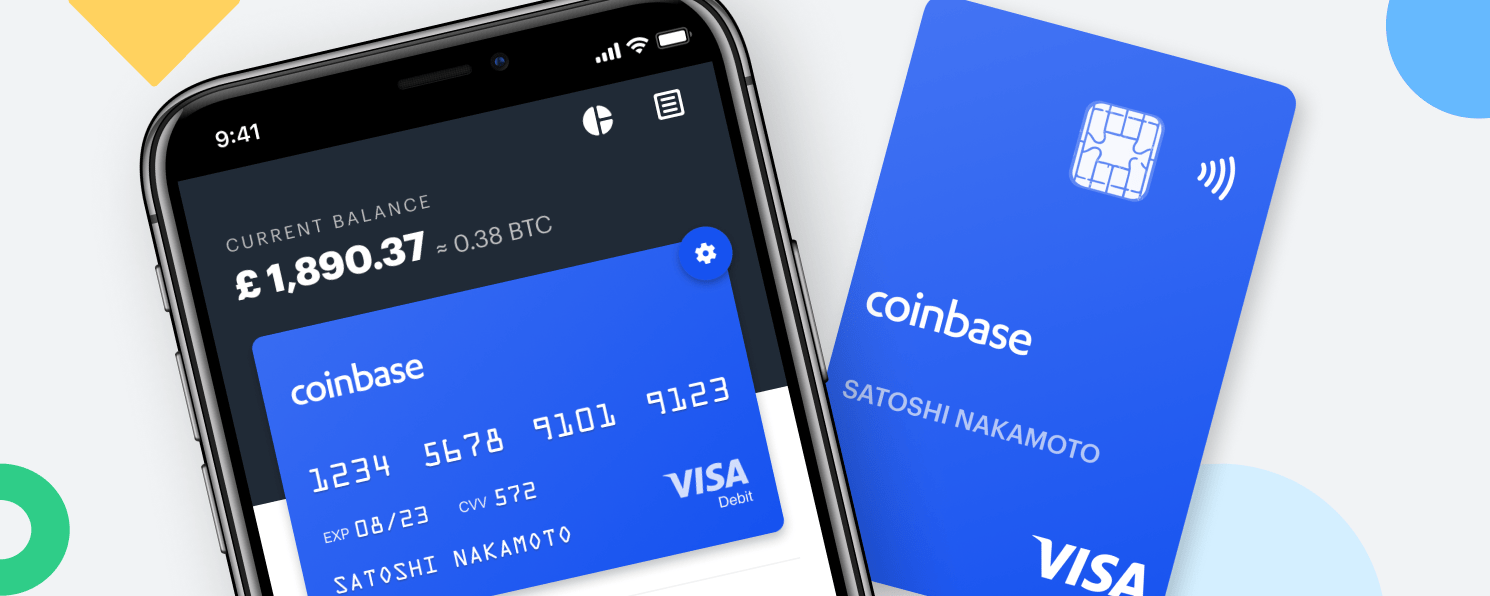
Coinbase Card is a crypto debit card that functions on the Visa network. The Coinbase Card allows Coinbase users to seamlessly spend their cryptocurrency balances wherever Visa is accepted. The Coinbase card charges no fees on crypto spending. However, there is a spread in the price when buying or selling cryptocurrencies while the transaction is being submitted.
Coinbase Card users in the United States can earn crypto rewards when they spend with their card. The Coinbase Card features rotating rewards, which means that the crypto assets users can earn change periodically.
Users are presented with multiple options when it comes to the cryptocurrency to earn rewards in, although not all cryptocurrencies have the same rewards rate. For example, the rewards rate for Bitcoin is at 1%, while it can be as high as 4% for some of the other cryptocurrencies.
Coinbase is one of the most reputable cryptocurrency exchanges on the market, and has a stellar track record of keeping customers’ crypto safe. If you put a premium on security, the Coinbase Card is definitely an option worth considering.
Get the Coinbase Card
4. Venmo Credit Card – A credit card that can automatically convert cashback rewards into crypto

The Venmo Credit Card is not a crypto card in the traditional sense, as it doesn’t make it possible for users to spend their cryptocurrency balances. However, we believe it’s still a compelling option for crypto enthusiasts, as Venmo Credit Card holders can choose to have all of their cashback rewards automatically converted to crypto (the Venmo platform now allows users to buy, sell and hold various cryptocurrencies).
The Venmo Credit Card has no annual fees and offers 3 tiers of cashback rewards:
- 3% cashback on the user’s top spending category
- 2% on the user’s second biggest spending category
- 1% on all other eligible purchases
If you want to convert your cashback rewards into crypto, Venmo currently offers four options — Bitcoin, Ethereum, Litecoin and Bitcoin Cash. Venmo doesn’t charge a transaction fee for converting cashback rewards to crypto, but they do charge a spread which has a slight impact on the amount of crypto you will get.
Get the Venmo Credit Card
5. Crypto.com Visa Card – Earn rewards in CRO and get exclusive perks
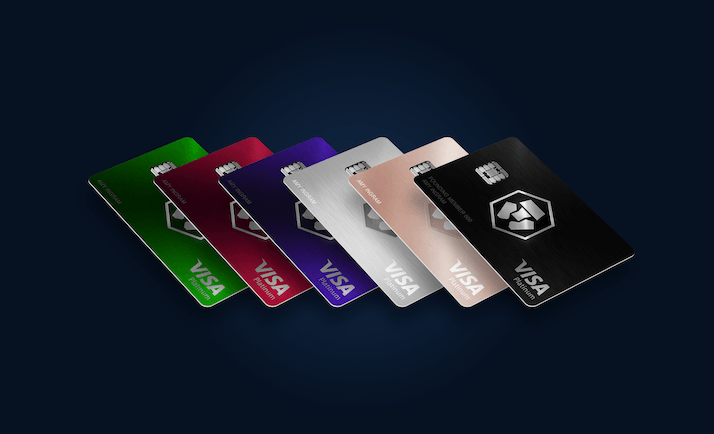
The Crypto.com Visa Card is a crypto debit card issued by the Crypto.com cryptocurrency exchange. The card comes in 5 different tiers, with crypto rewards and other perks varying across tiers. With the Crypto.com Visa Card, users can spend their cryptocurrency balances on Crypto.com wherever Visa cards are accepted. The card supports numerous different cryptocurrencies and stablecoins and is generally considered one of the best crypto cards for USDT users.
Similarly to the Binance Card’s BNB holding requirements for crypto cashback rewards, the downside of the Crypto.com Visa Card is that you need to stake the exchange’s CRO tokens if you want to access the higher card tiers. Here’s a quick breakdown of the Crypto.com Visa Card tiers and their associated staking requirements as of January 2023.
| Card tier | Required CRO stake | CRO rewards | Monthly CRO rewards cap |
|---|---|---|---|
| Midnight Blue | 0 | 0 | n/a |
| Ruby Steel | $400 equivalent | 1% | $25 equivalent |
| Royal Indigo / Jade Green | $4,000 equivalent | 2% | $50 |
| Frosted Rose Gold / Icy White | $40,000 equivalent | 3% | unlimited |
| Obsidian | $400,000 equivalent | 5% | unlimited |
As you can see, the higher card tiers have substantial CRO staking requirements. If you’re primarily interested in crypto cashback rewards, these requirements don’t compare favorably to what you can get on a Binance Card.
For example, you need to stake $40,000 worth of CRO to access the Frosted Rose Gold / Icy White tier, which comes with 3% CRO rewards on spending. With the Binance Card, the requirement for the 3% BNB rewards tier is holding 10 BNB, which translates to about $3,000 at the time of writing.
However, Crypto.com has an ace up its sleeve that could tip the scales in favor of their card, depending on what you prioritize. Card holders are eligible for perks, which include free subscriptions to popular services such as Spotify, Netflix, Amazon Prime and others. These perks vary depending on the card tier, and can get quite fancy with the higher card tiers. For example, the three highest tiers offer airport lounge access.
Get the Crypto.com Visa Card
6. Wirex Card – A crypto card with up to 8% rewards for eligible members

The Wirex Card is a multicurrency card using the Mastercard payments network that’s issued by the Wirex cryptocurrency platform. The Wirex Card can be used to spend cryptocurrencies, as well as fiat currencies. The Wirex Card supports almost 70 (crypto)currencies in total.
Through the Wirex Cryptoback program, the Wirex Card offers crypto rewards on transactions made with the card. These rewards are paid in the form of Wirex’s WXT token, and can go up to 8% per transaction.
The Cryptoback rewards depend on your Wirex membership type. Wirex offers three different membership options (Free, Premium and Elite), which come with a monthly subscription. Within each of these options, users can achieve three tiers (Entry, Enhanced and Ultimate), depending on how much WXT tokens they lock for a period of 180 days. Higher tiers offer higher Cryptoback rewards.
The Wirex Card can be a good option if you’re already interested in using the Wirex app, which provides a convenient way of onboarding into crypto and cashing out to fiat. However, the requirement of holding WXT tokens to earn substantial rewards is a downside.
Get the Wirex Card
7. BitPay Card – A straightforward crypto card with cashback at supported merchants

The BitPay Card is a crypto debit card on the Mastercard network that’s issued by cryptocurrency payments company BitPay. The card allows users to spend 8 different cryptocurrencies, as well as a wide selection of stablecoins, wherever Mastercard is accepted.
When using the BitPay card, user can earn cashback rewards. However, the cashback rewards don’t apply to all purchases, as they are only available at selected merchants. According to BitPay, there are more than 100,000 places where users can get cashback rewards when using the BitPay Card.
In the BitPay app, you can find a list of online and physical locations where cashback rewards are supported. While BitPay’s cashback program is more limited than what’s offered by competitors, the benefit is that you don’t need to hold any specific tokens in order to become eligible.
Get the BitPay Card
8. Gemini Credit Card – A credit card with crypto rewards of up to 3%
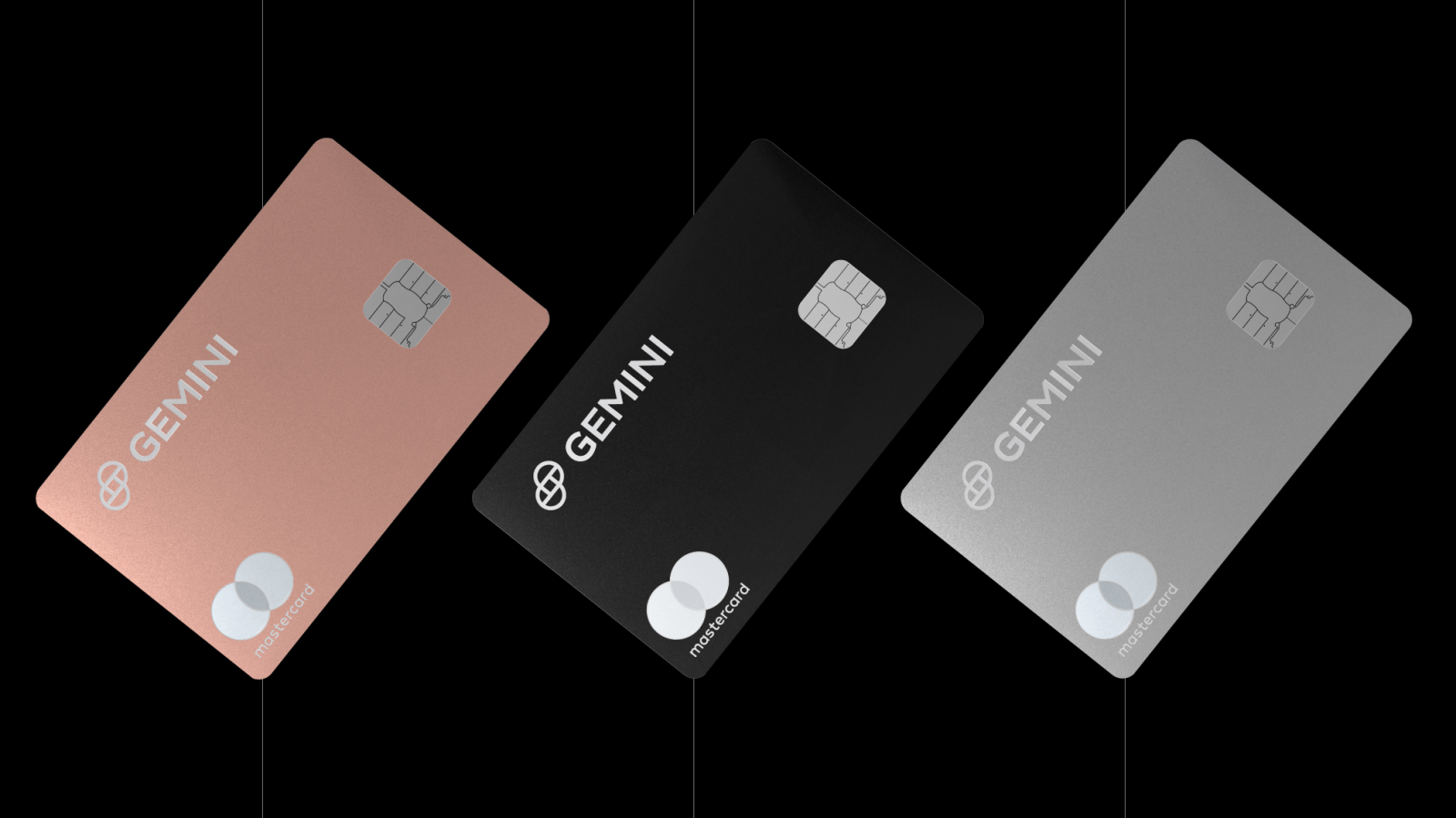
The Gemini Credit Card is a credit card that allows users to earn rewards in the form of cryptocurrencies. The Gemini Credit Card uses the Mastercard payments network and is offered by the Gemini cryptocurrency exchange. The card is available digitally, as well as physically in three different colors.
The rewards can be paid out with any of the cryptocurrencies available on the Gemini cryptocurrency exchange. The card offers 3% rewards on dining, 2% rewards on groceries, and 1% rewards on all other purchases.
Unlike the other cards featured in this article, the Gemini Credit Card is not meant for spending cryptocurrencies. Instead, the unique feature of this crypto rewards credit card is that users earn cryptocurrency rewards. The crypto rewards become available in the user’s Gemini account immediately after the purchase is made.
A strong point of the Gemini Credit Card is that users can choose which cryptocurrency they want to receive their rewards in. Users can change the crypto to receive as many times as they want. So, you can earn Bitcoin rewards or choose a more exotic altcoin that you believe has higher upside.
Get the Gemini Credit Card
Crypto card comparison chart
Now that we’ve learned about some of the best crypto credit and debit cards on the market, let’s go through a quick overview of how they stack up against each other.
| Type | Network | Rewards | Best feature | Worst feature | |
|---|---|---|---|---|---|
| Binance Card | Crypto debit card | Visa | Up to 8% | High rewards, relatively low requirements | Requires users to hold BNB to access higher rewards tiers |
| Ledger Card | Crypto debit card | Mastercard | Up to 2% | Integration with Ledger Live software, robust security |
Lower cashback rewards than ome competitors |
| Coinbase Card | Crypto debit card | Visa | Up to 4% | Doesn’t require users to hold any special tokens to be eligible or rewards |
Rewards aren’t as high as competitors |
| Crypto.com Visa Card | Crypto debit card | Visa | Up to 5% | Special perks fork higher card tiers | Requires significant CRO stake or higher tiers |
| Wirex Card | Crypto debit card | Mastercard | Up to 8% | High rewards for eligible users | Complicated tier structure, requires users to hold WXT tokens for higher tiers |
| BitPay Card | Crypto debit card | Mastercard | Cashback rewards vary depending on the merchant |
Straightforward product, no token holding requirements |
Cashback rewards are not available at all merchants |
| Gemini Credit Card | Credit card with crypto rewards |
Mastercard | Up to 3% | Users can choose between 60 cryptocurrencies to earn rewards in |
Doesn’t allow users to spend crypto balances |
The bottom line: Which crypto card to get?
When looking at all the different crypto cards, it quickly becomes clear that crypto cards can be divided into two main categories. There are cards that offer higher rewards but have specific token-holding requirements and cards that offer lower rewards but don’t require users to hold any specific tokens.
If you are already interested in holding tokens like BNB, CRO, and WXT, cards like Binance Card, Crypto.com Visa Card, and Wirex Card are probably worth it. However, these tokens are volatile, and the value of your token holdings could depreciate by much more than what you earn in rewards on your card spending. Among these cards, the Binance Visa Card probably offers the best value proposition.
If you prefer to play it a bit safer but still want to spend your crypto conveniently and earn some rewards along the way, consider getting a Coinbase Card or BitPay card. The Gemini Credit Card is also a compelling option if you are only interested in earning crypto rewards.
So, the bottom line is that the best crypto card for you will depend on your risk tolerance—if you’re willing to hold volatile tokens, you can access higher rewards.
Check out our ultimate guide on cryptocurrency investing for useful tips and general information on how to approach investing in crypto.





 Bitcoin
Bitcoin  Ethereum
Ethereum  Tether
Tether  Dogecoin
Dogecoin  USDC
USDC  Cardano
Cardano  TRON
TRON  Chainlink
Chainlink  Stellar
Stellar  Hedera
Hedera  Bitcoin Cash
Bitcoin Cash  LEO Token
LEO Token  Litecoin
Litecoin  Cronos
Cronos  Ethereum Classic
Ethereum Classic  Monero
Monero  Dai
Dai  Algorand
Algorand  OKB
OKB  Cosmos Hub
Cosmos Hub  Stacks
Stacks  Theta Network
Theta Network  Gate
Gate  Maker
Maker  KuCoin
KuCoin  Tezos
Tezos  IOTA
IOTA  NEO
NEO  Polygon
Polygon  Zcash
Zcash  Synthetix Network
Synthetix Network  Tether Gold
Tether Gold  TrueUSD
TrueUSD  Dash
Dash  Holo
Holo  Zilliqa
Zilliqa  0x Protocol
0x Protocol  Enjin Coin
Enjin Coin  Siacoin
Siacoin  Qtum
Qtum  Basic Attention
Basic Attention  Bitcoin Gold
Bitcoin Gold  Ravencoin
Ravencoin  Decred
Decred  NEM
NEM  DigiByte
DigiByte  Ontology
Ontology  Waves
Waves  Nano
Nano  Status
Status  Huobi
Huobi  Lisk
Lisk  Hive
Hive  Numeraire
Numeraire  Steem
Steem  Pax Dollar
Pax Dollar  BUSD
BUSD  OMG Network
OMG Network  Ren
Ren  Bitcoin Diamond
Bitcoin Diamond  Bytom
Bytom